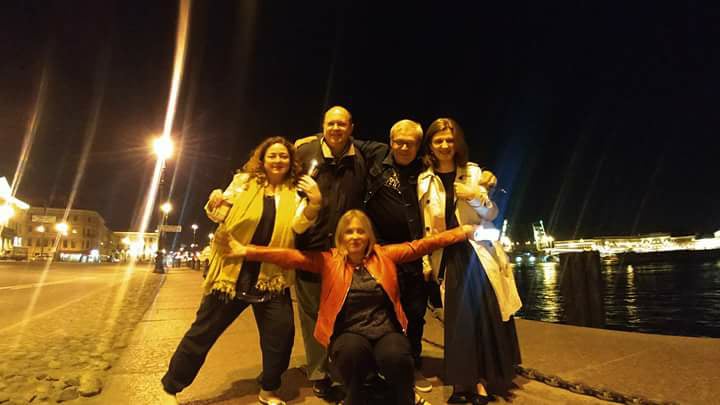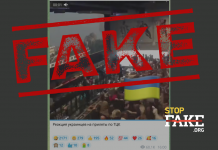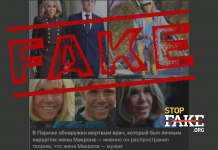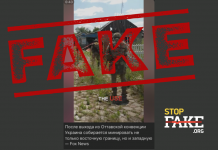In 2017 StopFake and its partners from the Central and Eastern Europe presented the result of local media monitoring in search for Kremlin propaganda and disinformation. The research proved that the propaganda centres in each country use the same technics, changing accents according to characteristics of the country, manipulating facts and emotions, hitting weak spots, artificially amplifying problems and trying to stir up internal conflicts.
In widespread image, propaganda content serving Moscow has to be consistent with official Kremlin narration and it is the best when it is spread by official Russian media or websites. Then, the situation is clear – the communique comes from official propaganda channels, is picked up on by pro-Russia circles and spread in the country. An average citizen observing the political stage and following information web portals is deluded by the image having probably its roots in the Polish People’s Republic period, that the right wing is more sensitive to Russian influences and more Western-oriented while the left wing if pro-Russian because it is associated with the communist period. Thus, when a right-wing website gives a piece of information, by the nature it should not be a pro-Kremlin propaganda. Even more, when it is authenticated by a catholic priest (in the stereotypical understanding, an orthodox priest can be suspicious because he is associated with the East), the content cannot be contaminated. Nothing more wrong. Unfortunately, on the informational war, stereotypes are our disadvantage. What matters, are facts.
What counts for Russian services, is a conflict
Professor Przemysław Żurawski vel Grajewski evoked lately in the interview for StopFake the example of Moldova. Russian special services created there in the pretty much the same time to organisations – LGBT and orthodox fundamentalists. As one can assume, the two, having opposing value vectors, started to fight each other. Both were headed by Russian agents. That way, the whole Moldovan political scene were occupied and the message coming from Moldova to its citizens and outside, was being controlled. For the internal use, the traditional electorate was shown how scary is the European Union supporting gays and lesbians. On the other hand – the European union was shown how primitive, old-fashioned and intolerant is Moldova – because such people are being attacked there. As professor Żurawski vel Grajewski noticed, that way the political interest was “served” on both directions in complete detachment from the ideologic point of the conflict. For Russian services it does not matter under what banner someone appears – what matters is the existence of a conflict that would destabilise the political scene and push it further from the West.
Marcin Rey, the creator of the profile Rosyjska V kolumna w Polsce (Russian V Column in Poland) had similar observations. He noticed that Russians will stimulate all the sentiments, even those theoretically anti-Russian ones. The fact that something looks anti-Russian, is no alibi. In Rey’s opinion, the classical example is a nationalist who is averse to all foreign countries, including Russia. As long as he slanders Ukraine, he will be welcomed.
However, someone is needed to feed with content both clueless nationalist from the example or a member of pro-Russian organisation. Not always is it a leading officer, presenting himself openly: “Good morning, I’m an agitator and agent and from now on you’re supposed to listen to me”. It would be too naïve. The recent publication of wPolityce.pl sheds light on where the conscious and involuntary agitators come from.
“Why no one points out America starting wars all the time?”
A group of Polish journalists visited Moscow at the beginning of May. The stay in Russian capital was the culmination point of their trip financed by the Alexander Gorchakov Public Diplomacy Fund (established in 2010 by the Russian president Dmitri Medvedev, the fund has in its statute goals, among others, promoting Russian social programs outside of the country and supporting of Russian-speaking media) – the portal informed. In Petersburg, the journalists were accompanied by Leonid Sviridov who had to leave Poland in the late 2015. He was accused in media of spy activity for Russia.
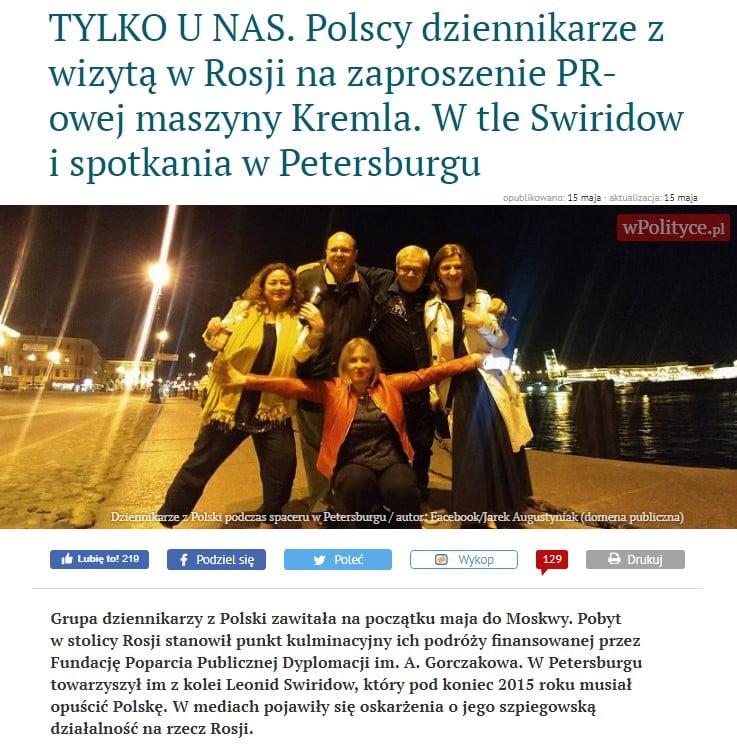
Leonid Drachevsky (former Russian Federation ambassador in Warsaw and deputy minister of foreign affairs of Russia) also expressed his joy from the meeting with Polish journalists. They met on the 10th of May to (as the fund’s website states) discuss the matter of direct contacts between Polish and Russian civil societies.
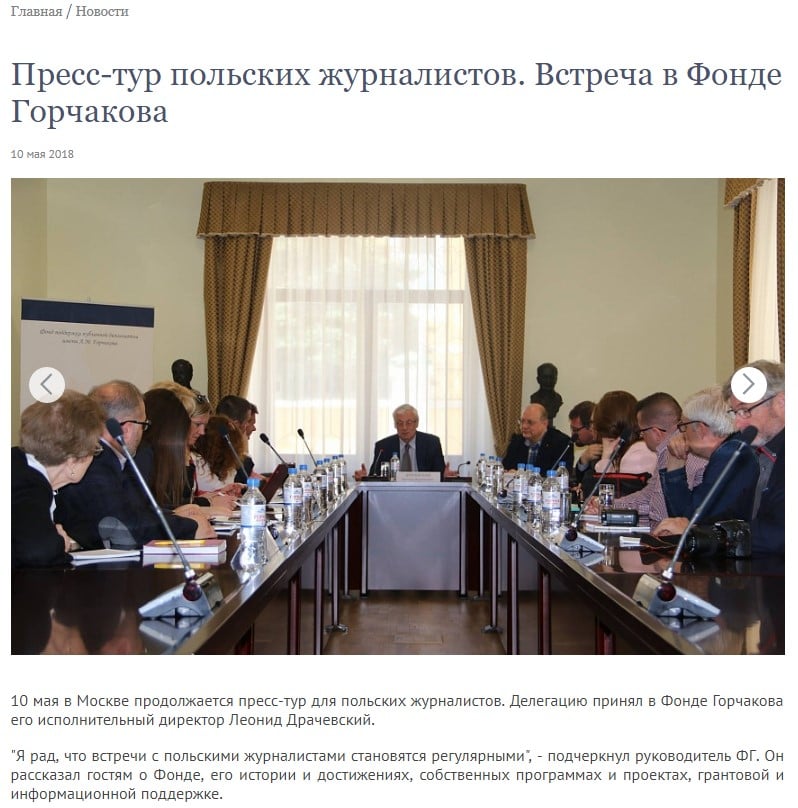
What is worth noticing, Russians did not segregate the invited journalists according to their political views. In the excursion participated both journalists from leftist „Nie”, as well as from right-wing journals, for example Agnieszka Piwar (“Myśl Polska”, konserwatyzm.pl, “Opcja na prawo”, former secretary of the Catholic Journalists Association – Katolickie Stowarzyszenie Dziennikarzy).
What is the fruit of such trips? Let speak the right-wing journalist. Agnieszka Piwowar, asked by wPolityce, if she was not bothered by the fact that the world public opinion points out Russian occupation of Crimea, the war in Ukraine and the intervention in Caucasus, responds:
And why no one points out Israel murdering Palestinians? Why no one points out America starting wars all the time? Making a scary enemy and an aggressor out of Russia is incomparable to what Israel and USA do. Why journalists don’t ask Polish politicians about their close relations with Americans and Israelis? Why all the time only those who make gestures of conciliation with Russia are criticised? Such circles as mine are all the time attacked only because we dare to reach out to Russia for peaceful purposes, because we don’t want to live in conflict with this country. Russia is being demonized. We hear only: Crimea, Crimea, Crimea. What about Israel? Why no one says what is happening in Gaza Strip? No one has courage to speak about it, but only to attack Russia.
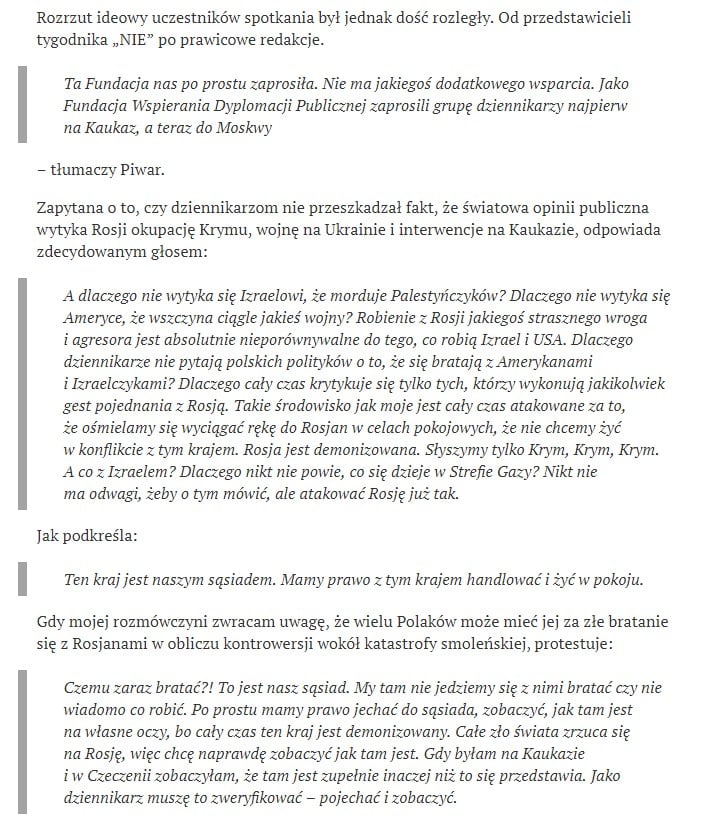
Reading this statement without knowing the name of the author, one could assume those are words of, for example, a pro-Russian party Zmiana (Change) activist, not of a former secretary of the Catholic Journalists Association, therefore related with conservatively sounding titles. Although, as Marcin Rey notices, contradictions are natural and even desirable for Russia’s point of view, because they give more authenticity. Most of the readers will never get to the information about journalists’ travel to Moscow, many of them will forget it the next day, but the views of the journalists fascinated in Putin’s Russia will shape many unconscious readers’ minds for the long time.
WP


